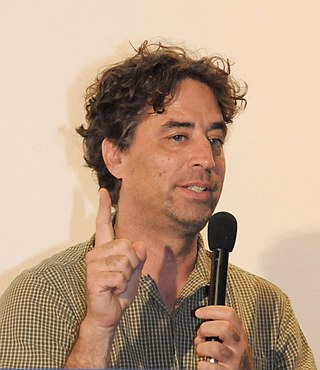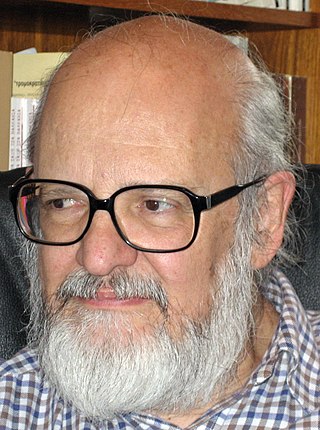Summary
Multitude is divided into three sections: "War," which addresses the current "global civil war"; [1] "Multitude," which elucidates the "multitude" as an "active social subject, which acts on the basis of what the singularities share in common"; [1] and, "Democracy," which critiques traditional forms of political representation and gestures toward alternatives.
Multitude addresses these issues and elaborates on the assertion, in the Preface to Empire, that:
"The creative forces of the multitude that sustain Empire are also capable of autonomously constructing a counter-Empire, an alternative political organization of global flows and exchanges." [2]
An information society is a society where the usage, creation, distribution, manipulation and integration of information is a significant activity. Its main drivers are information and communication technologies, which have resulted in rapid growth of a variety of forms of information. Proponents of this theory posit that these technologies are impacting most important forms of social organization, including education, economy, health, government, warfare, and levels of democracy. The people who are able to partake in this form of society are sometimes called either computer users or even digital citizens, defined by K. Mossberger as “Those who use the Internet regularly and effectively”. This is one of many dozen internet terms that have been identified to suggest that humans are entering a new and different phase of society.

Antonio "Toni" Negri is an Italian Spinozistic-Marxist sociologist and political philosopher, best known for his co-authorship of Empire and secondarily for his work on Spinoza. Born in Padua, he became a political philosophy professor in his hometown university. Negri founded the Potere Operaio group in 1969 and was a leading member of Autonomia Operaia. As one of the most popular theorists of autonomism, he has published hugely influential books urging "revolutionary consciousness".

The public sphere is an area in social life where individuals can come together to freely discuss and identify societal problems, and through that discussion influence political action. A "Public" is "of or concerning the people as a whole." Such a discussion is called public debate and is defined as the expression of views on matters that are of concern to the public—often, but not always, with opposing or diverging views being expressed by participants in the discussion. Public debate takes place mostly through the mass media, but also at meetings or through social media, academic publications and government policy documents.

Michael Hardt is an American political philosopher and literary theorist. Hardt is best known for his book Empire, which was co-written with Antonio Negri.
Biopolitics refers to the political relations between the administration of life and a locality's populations, where politics and law evaluate life based on perceived constants and traits. French philosopher Michel Foucault, who wrote about and gave lectures dedicated to his theory of biopolitics, wrote that it is "to ensure, sustain, and multiply life, to put this life in order."

Empire is a book by post-Marxist philosophers Michael Hardt and Antonio Negri. Written in the mid-1990s, it was published in 2000 and quickly sold beyond its expectations as an academic work.
Multitude is a term for a group of people who cannot be classed under any other distinct category, except for their shared fact of existence. Though its use dates back to antiquity, the term first entered into the lexicon of political philosophy when it was used by figures like Machiavelli, Hobbes, and most notably, Spinoza. The multitude is a concept of a population that has not entered into a social contract with a sovereign political body, such that individuals retain the capacity for political self-determination. A multitude typically is classified as a quantity exceeding 100. For Hobbes the multitude was a rabble that needed to enact a social contract with a monarch, thus turning them from a multitude into a people. For Machiavelli and Spinoza both, the role of the multitude vacillates between admiration and contempt. Recently the term has returned to prominence as a new model of resistance against global systems of power as described by political theorists Michael Hardt and Antonio Negri in their international best-seller Empire (2000) and expanded upon in their Multitude: War and Democracy in the Age of Empire (2004). Other theorists recently began to use the term include political thinkers associated with autonomist Marxism and its sequelae, including Sylvère Lotringer, Paolo Virno, and thinkers connected with the eponymous review Multitudes.

Takis Fotopoulos is a Greek political philosopher, economist and writer who founded the Inclusive Democracy movement, aiming at a synthesis of classical democracy with libertarian socialism and the radical currents in the new social movements. He is an academic, and has written many books and over 900 articles,. He is the editor of The International Journal of Inclusive Democracy and is the author of Towards An Inclusive Democracy (1997) in which the foundations of the Inclusive Democracy project were set. His latest book is The New World Order in Action: Volume 1: Globalization, the Brexit Revolution and the "Left"- Towards a Democratic Community of Sovereign Nations. Fotopoulos is Greek and lives in London.
Autonomism, also known as autonomist Marxism, is an anti-capitalist left-wing political and social movement and theory. As a theoretical system, it first emerged in Italy in the 1960s from workerism. Later, post-Marxist and anarchist tendencies became significant after influence from the Situationists, the failure of Italian far-left movements in the 1970s, and the emergence of a number of important theorists including Antonio Negri, who had contributed to the 1969 founding of Potere Operaio as well as Mario Tronti, Paolo Virno and Franco "Bifo" Berardi.
Affective labor is work carried out that is intended to produce or modify emotional experiences in people. This is in contrast to emotional labor, which is intended to produce or modify one's own emotional experiences. Coming out of Autonomist feminist critiques of marginalized and so-called "invisible" labor, it has been the focus of critical discussions by, e.g., Antonio Negri, Michael Hardt, Juan Martin Prada, and Michael Betancourt.
Posthegemony or post-hegemony is a period or a situation in which hegemony is no longer said to function as the organizing principle of a national or post-national social order, or of the relationships between and amongst nation states within the global order. The concept has different meanings within the fields of political theory, cultural studies, and international relations.
Precarity is a precarious existence, lacking in predictability, job security, material or psychological welfare. The social class defined by this condition has been termed the precariat.
Gopal Balakrishnan was a professor in the History of Consciousness Department at the University of California, Santa Cruz, until he was fired due to allegations of sexual assault.

Commonwealth is a book by autonomous Marxist theorists Michael Hardt and Antonio Negri. It completes a trilogy which includes Empire and Multitude: War and Democracy in the Age of Empire.
The global citizens movement is a constellation of organized and overlapping citizens' groups seeking to foster global solidarity in policy and consciousness. The term is often used synonymously with the anti-globalization movement or the global justice movement.
Post-Marxism is a political philosophy, critical social theory and Marxist school of thought which radically reinterprets Marxism, countering classical Marxist economism, historical determinism, anti-humanism, and class reductionism, whilst remaining committed to the construction of socialism. Post-Marxism can be considered a synthesis of post-structuralist frameworks and neo-Marxist analysis, in response to the decline of the Left after the protests of 1968. Most notably, post-Marxists are anti-essentialist, rejecting the primacy of class struggle, and instead focus on building radical democracy.
Immaterial labor is a Marxist framework to describe how value is produced from affective and cognitive activities, which, in various ways, are commodified in capitalist economies. The concept of immaterial labor was coined by Italian sociologist and philosopher Maurizio Lazzarato in his 1996 essay "Immaterial Labor", published as a contribution to Radical Thought in Italy and edited by Virno and Hardt. It was re-published in 1997 as: Lavoro immateriale. Forme di vita e produzione di soggettività.. Lazzarato was a participant in the Years of Lead (Italy) group as a student in Padua in the 1970s, and is a member of the editorial group of the journal Multitudes. Post-Marxist scholars including Franco Berardi, Antonio Negri, Michael Hardt, Judith Revel, and Paolo Virno, among others have also employed the concept.
Governance without government is a form of governance which uses non-governmental means of government. It is a paradigm opposing modern democracy. Modern democracy uses democratic procedures and institutions, including legislation and communicative rationality, whereas governance without government uses laws of nature instead of legislation, and one-way communication instead of dialogue.
A multitude is a vague term for a large number of people, typically relating to an assembly.







